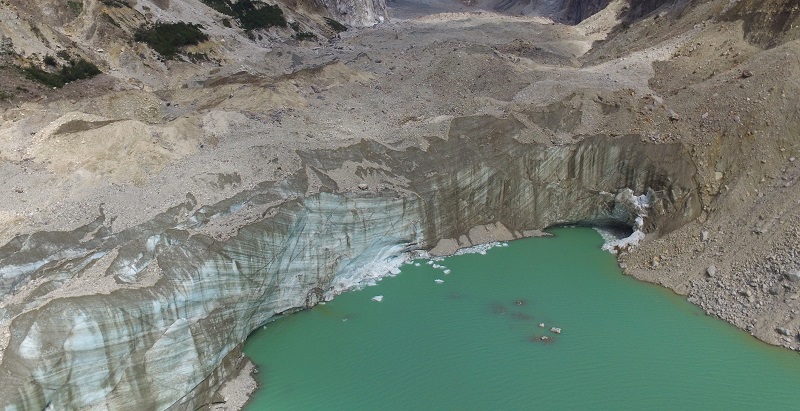Aberystwyth scientists lead Kathmandu glacial flood workshop

A glacial lake formed as the Chileno Glacier in Chilean Patagonia retreats. In South America an estimated 15,000 deaths have been caused by Glacial Lakes Outburst Floods over the past 200 years.
28 November 2017
The risk of flash flooding in Nepal caused by the failure of large glacial lakes will be the focus for a two day workshop hosted by Aberystwyth scientists in Kathmandu which starts today, Tuesday 28 November 2017.
Glacial lakes and GLOF (Glacial Lakes Outburst Floods) hazard assessment and mitigation: Chile and Nepal is organised by Professor Neil Glasser and Dr Ryan Wilson from the Centre for Glaciology at the Department of Geography and Earth Sciences.
Glacial lakes are formed when high mountain glaciers retreat as a result of climate change.
Large volumes of water held back by glacial debris – rocks, stones and mud- become unstable over time and prone to bursting, releasing vast quantities of water into the valleys below.
In South America an estimated 15,000 deaths have been caused by Glacial Lakes Outburst Floods, known as GLOFS to glaciologists, over the past 200 years.
In one event alone, in Peru in 1941, 5000 people lost their lives.
More recently, in 2015 the failure of a glacial lake in the Chileno Valley in Chilean Patagonia saw 1.8 million cubic meters of water released over an area of 10 kilometres. The remoteness of the area meant that no lives were lost.
However, the events also pose a significant risk to infrastructure.
Hydro-electric power schemes, roads and bridges are often destroyed and the annual cost of flood-related damage and mitigation projects run into several 100 million Euros.
Led by Professor Neil Glasser, Aberystwyth glaciologists have been working with scientists in the UK and Chile to get a better understanding of how glacial lakes form and the risks they pose.
Funded by NERC (the Natural Environment Research Council) and CONICYT, the Chilean National Science Research and Technology Commission, Professor Glasser and colleagues are now looking to apply the work in South America to assess the risks in the Himalayas.
Professor Glasser, Project Director of the Chile-UK Research, said: “Extensive research has been done to understand the underlying problem with glacial lakes in South America, and some of the measures that can be introduced to mitigate some of the potential damage. The workshop in Kathmandu is about applying what we have learnt in South America to the Himalayas, so that the authorities in Nepal can plan for potentially destructive and life-threatening flood events in the future.”
The workshop brings together experts from the UK and South America with representatives from public, commercial and educational organisations in Nepal.
Areas for discussion include the use of satellite imagery to map and monitor glacial hazards in the Himalayas and Chile, and a review of what is already in place in Nepal.
Delegates will also review the effectiveness of new laws introduced in Chile to protect glacial areas from mining activity to reduce the risk of future flooding events and whether they could be applied to Nepal.
In March 2017, Dr Ryan Wilson and Dr Stephan Harrison from Exeter University warned of the dangers posed by glacial lakes in Chile.
Both will be presenting research at the Kathmandu workshop.
Glacial lakes and GLOF hazard assessment and mitigation: Chile and Nepal
The ‘Glacial lakes and GLOF hazard assessment and mitigation: Chile and Nepal’ workshop has been organised as part of the ‘Glacial Hazards in Chile’ project.
‘Glacial hazards in Chile: processes, assessment, mitigation and risk management strategies’ is an ongoing research project aiming to answer key questions concerning past, present and future glacial hazards in Chile.
The project will assess the changing magnitude, frequency, and distribution of different glacial hazards in Chile under current and future global climate change.
The project brings together leading researchers from Aberystwyth University, Austral University of Chile, Exeter University, Reynolds International Ltd, Geoestudios Ltda, Chile, and the University of Magallanes, Chile.
The project is jointly funded by the RCUK (Research Councils UK) – NERC (Natural Environment Research Council) in the UK and CONICYT (Comisión Nacional de Investigación Científica y Tecnológica) in Chile.



